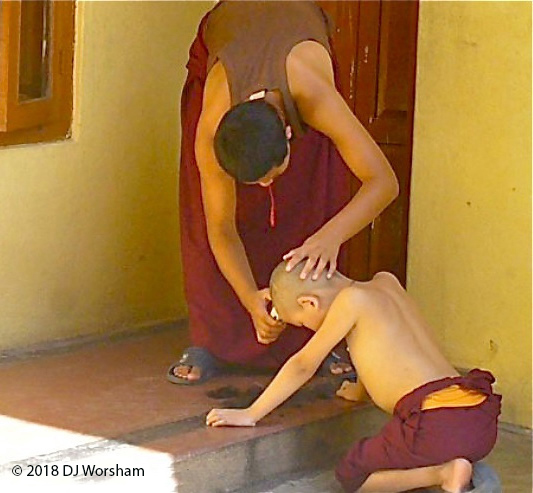
Mingma Sherpa, age 8, waits in the courtyard of Thupten Choling monastery wearing Chinese-made jeans and a Chicago Bulls t-shirt. Tears river down cheeks turned to watch his dad disappear along the broken and muddy trail terracing the hillside down to the villages below.
His name will be gone before the tears dry.
200 Nepal Rupees hide in his right hand, closed fist-tight, against the awkward handles of a plastic grocery bag containing everything he owns: another t-shirt, this one L.A. Lakers, Kobe printed on its back, and two more pairs of jeans. His left hand is lost in the palm of the monk who has come to meet him.
“Breathe slowly,” the monk whispers. “Like me.”
The courtyard is busy. Mingma looks for friendly faces but sees only the insistent movement of work. Brooms slap flags draped under open windows. Falling dust bends light shattered by old, lead, panes. Bok Choy fills baskets. Rice finds its way through wicker strains, rattling the tin bottom of a pot bigger than any he has ever seen. Purple potatoes peel and fall—incense burns. Food cooks, releasing aromas he does not know.
“You are hungry,” his companion says.
Grandma Ama made Tibetan bread for breakfast this morning, mixing wheat flour and water right on the table, breaking and rolling the dough until she formed it into little balls. She flattened them under the heel of her hand and cut four slits through each marking a bready square that looked like a big button. Then she slid them in boiling oil, one at a time, turned them, once then twice, and popped them out, hot and greasy, waiting for honey.
“Ones for me have five holes,” Mingma remembers. “She cuts one extra in the middle just for me.” He wants to tell the monk this story, wants to brag about his special bread, and wants to taste that bread again.
He and his dad had three each before leaving home and he ate another, one his grandmother had secreted away in his pocket, on the hike up to the monastery.
His clothes are traded for saffron and crimson sheets that wrap around his waist and knot on the side. It takes five tries to make the knot hold. Four times the sheets fall. Four times he stands naked.
His bag and money disappear.
On the edge of the courtyard, he kneels. A hand holds his head down. Hair passes his eyes and pools on the ground.
Since he believed, as he was taught, in the deep compassion that could mend broken families and soften hard lives, with all the disappointment, the pain of his mother’s passing, and the fear he felt the morning they took her to the pyre, knowing at that moment what others had. for days but would not yet talk about, that his dad would have to leave, returning to work on the porter path carrying loads for tourists, and that Grandma Ama was too weak to care for him alone, Mingma, now without last name and willing to give even more, on his way to becoming Mingma Lama, stood up and looked around seeing suddenly so many others just like him. Their faces promised hope.
